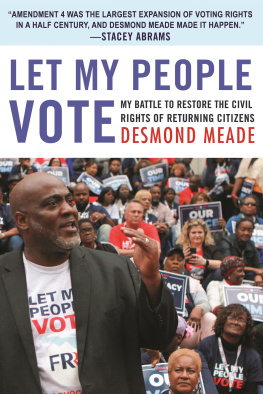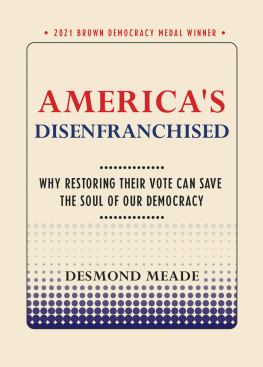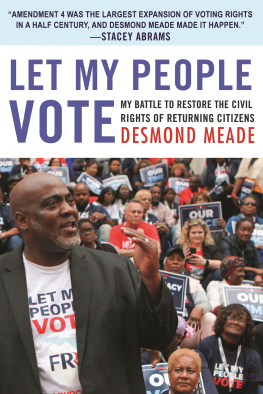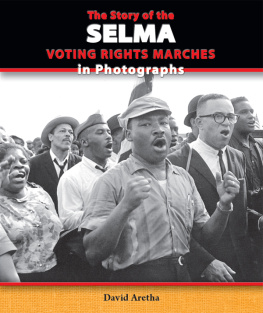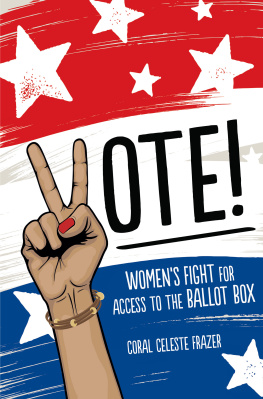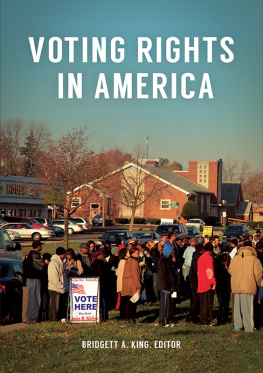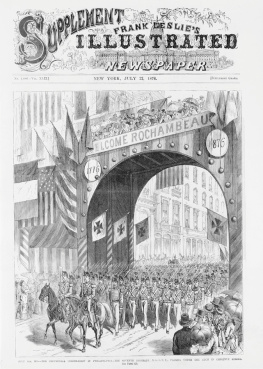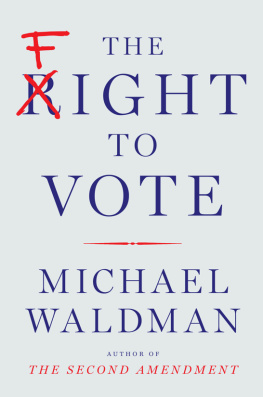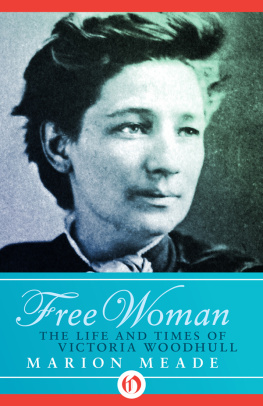Contents
Guide
Pagebreaks of the print version

PROLOGUE
LOVE HAS WON THE DAY
O N JANUARY 8, 2018 , I registered to vote. I was fifty years old. It wasnt a lack of civic interest that had kept me away from the polls before. Rather I, like approximately 1.4 million Floridians, had been denied the right to vote, along with other civil rights, such as the right to serve on a jury or to hold public office, because of our felony convictions. The citizens initiative for an amendment to the state constitution that my organization, the Florida Rights Restoration Coalition, had spearheaded changed all that.
You would think that the new governor of the state of Florida being sworn in would be the biggest news story, as his inauguration happened on the same day. But the headline was people like me embracing our role in the democratic process. If you were to believe the papers, you would have expected ex-felonswhom we called returning citizenswould have been turned away. Some thought the supervisors of elections across the state of Florida were going to have barricades erected or use fire hoses, and that there would be police who said, Oh no, you cant register yet, not until the governor says so. Some supporters of our ballot initiative were even organizing protests against offices they were sure would deny people the ability to register to vote. That is the legacy of trauma in this country that has been hard to overcome, the omnipresence of prejudice and discrimination that shapes what we have come to expect and fear in this country, even in the twenty-first century.
But the exact opposite happened on January 8. Voter registration agencies rolled out the red carpet. Some had balloons and confetti. You might have seen a shot of me covered in confetti that they popped from a pressurized bottle as I came out of the agency with my voter registration card in hand. You might have also seen some tears. There were so many tears of joy throughout the state of Florida. I took my family with me to go register because it was their votes on my behalf that had contributed to our successful proposed amendment, known as Amendment 4. My wife and my two sons voted yes for me because they loved me.
My daughter was actually the one to register me to vote, right in the elections office. I had one of my younger sons register for the first time along with me. I had been registered before, as a young man, but there was a guy there who had lost the right to vote before he was even eighteen. When Amendment 4 passed, not only did he register to vote for the first time, but he also brought his son, who was eighteen, along with him so they could register together. You had some people who registered to vote that day who had last voted for John F. Kennedy. You had people register to vote who were in their sixties and had never voted before in their lives.
Folks brought their family and their friends and their loved ones. Even supervisors in the election offices were crying. We were celebrating the expansion of democracy. We were celebrating the fact that what got us here was love. Just the previous November, our ballot initiative had passed by a margin of more than three hundred thousand people. We won based on inclusion and bringing people together. We showed the world that love can move major policy issues and get support from Democrats, Republicans, independents, who were white, Black, and Latino, rich and poor. I remember telling everyone with ears, Love has won the day.
That love extended to those who were now able to come out of the shadows about their own felony convictions. When I was out on the campaign trail collecting petitions, I would run across people who had been married for ten or fifteen years, and their spouse never knew their partner had a felony conviction. They had hidden that part of their lives from their loved ones, and I understood that as a returning citizen myself. Theres a pain that we have for the things that we did, for the pain that we created in the lives of our family and our friends, and in some cases, the people weve caused harm to. Amendment 4 gave a lot of people the courage to take an affirmative step to make amends in a positive way by registering to vote.
You may think the right to vote is a small matter, and if you do, I would bet you have never had it taken away from you. My wife, Sheena, ran for the Florida State House in 2016, and I couldnt even vote for her. Things like that are the difference between contribution to a cause and commitment to one. Both are good things, and both are needed, but there are folks who believe in something just enough to contribute to it, and there are those who believe in something so much that they are willing to make a sacrifice. I, like so many others, was forced to live in a reality that I would never be able to vote again as long as I lived in Florida. I have heard people say they hoped they could vote before they die because they wanted to know what it was like to feel like a citizen again, and I could understand that.
Voting can, of course, help you elect people who are paying greater attention to the particular needs of your communities, so it is practical. But its also a symbol. Out of all the rights stripped from men and women returning to society after serving time in prison, voting is really the only one that says I am a citizen of this country, and my voice does matter. You dont have to vote if you dont want to, but having the right to vote, that is what solidifies you as a person of consequence more than anything else in the world. That is especially important for people like me who made mistakes or suffered through addiction. We were made to feel we werent part of society anymore, that we were the lowest of the low. We were despised because of our addiction. We were despised because of the crimes we may have committed. What the right to vote says is that Im somebody again. It says, simply and powerfully, I AM.
The right to vote is one of many rights that need to be restored to individuals who have a previous felony conviction. According to Florida statutes, anyone whos convicted of any felony offenseand here we could be talking about driving with a suspended license or even tampering with an odometerautomatically loses their right to serve on a jury, to run for office, to own a firearm, and to vote. Those are the four basic civil rights that a person would lose, but other restrictions are even more immediately problematic. The collateral consequences of having a felony record, such as occupational license restrictions and the effective narrowing of job opportunities and options (you have to check that box on your job applications in most localities, and that means that many, if not most, jobs are off-limits for you), housing restrictions (you cant live in most publicly funded housing, and many homeowner associations have restrictions in their bylaws against owning or even renting a home in certain areas until your rights have been restored), and education restrictions (such as the inability to receive government-backed school loans if you have been convicted of certain crimes).
These collateral consequences are far-reaching and profound, and so are the effects of not having your rights restored. Without being able to get good, safe, and stable housing and decent job and educational opportunities, returning citizens cannot reintegrate back into their community, and their story is going to be written completely differently. Chances are much better that a returning citizen is going to recidivate, meaning relapsing or regressing into crime. In a study done by the Florida Parole Commission in 2011, only 11.1 percent of individuals who had their civil rights restored during the calendar years of 2009 and 2010 reoffended and were forced to return to incarceration or community supervision. The overall recidivism rate for inmates released from 2001 to 2008, on the other hand, was 33.1 percent.

